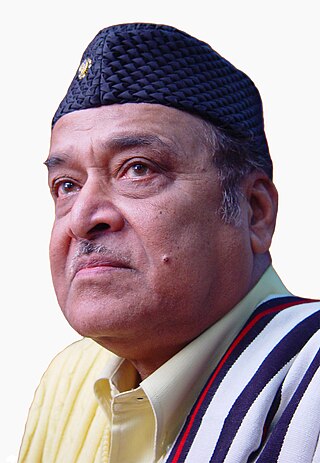
Bhupen Hazarika was an Indian playback singer, lyricist, musician, poet, actor, artist, editor, filmmaker, professor and politician from Assam, widely known as Sudha Kontho. His songs were written and sung mainly in the Assamese language by himself, are marked by humanity and universal brotherhood and have been translated and sung in many languages, most notably in Bengali and Hindi.

Komal Kothari (1929–2004) was an Indian folklorist and ethnomusicologist. Komal Kothari had devoted his life to investigation and documentation of folk traditions of western Rajasthan. Kothari received the honour of Padma Shri and Padma Bhushan from the Government of India. Komal Kothari painstakingly worked to preserve the cultural memory and made numerous recordings of folk music. He studied Langa and Manganiyar communities of folk musicians of Thar desert. Komal Kothari was not only a scholar but also a man of action. He co-founded Rupayan Sansthan - Rajasthan Institute of Folklore, in 1960 in the village of Borunda. The institution houses a repository of recordings by Kothari and works to collect, preserve, and disseminate the oral traditions of Rajasthan. Kothari was co-editor of the journal Lok Sanskriti, a journal based on the theme of folk culture. Besides, Kothari arranged international performances of folk artists from Rajasthan in several countries. His monograph on Langas, a folk-musician caste in Rajasthan, was enlivened by an accompanying album of recordings of twelve folk songs sung by Langa artistes. His understanding of desert culture and its connections with ecology endeared him to the environmentalists. He planned a museum based on the ecology of the broom’, to show the technical use of specific types of desert grass for specific purposes. His vision was actualised in the form of Arna Jharna - The Thar Desert Museum of Rajasthan in Borunda, near Jodhpur. Kothari was a scholar of patterns of culture and his expertise enriched both folklore studies and history.

Jyoti Prasad Agarwala was a noted Indian playwright, songwriter, poet, writer and film maker from Assam. He was deeply revered for his creative vision and output and is popularly called the Rupkonwar of Assamese culture. In fact, he is regarded as the founder of Assamese cinema for Joymoti (1935). His death anniversary is observed as Silpi divas his honor.

Pratima Barua Pandey was an Indian folk singer from the royal family of Gauripur in Western Assam's Dhubri district. Barua Pandey, a national awardee, best known for her Goalpariya songs Hastir Kanya and Mur Mahut Bandhure, was the daughter of Prakritish Chandra Barua (Lalji) and niece of filmmaker Pramathesh Barua of Devdas fame.

Arun Sarma was a writer of Assam. Arun Sarma was one of Assam's contemporary playwrights and is particularly known for his unconventional plays with some elements of drama. Besides drama, he also authored over six novels detailing the Assamese way of life. He was awarded the Padma Shri in 2010 in recognition of his contributions to Assamese literature. He has also been awarded the Sahitya Akademi Award in 1998 for the novel Ashirbadar Rong. He has won the Asam Sahitya Sabha's Best Playwright Award for two consecutive years and also has the rare distinction of having won the Sangeet Natak Akademi award in 2003 for his contributions to drama and the Sahitya Akademi award in 1998 for literature. He was also the recipient of the Assam Valley Literary Award in 2005.
Nilmani Phookan was an Indian poet in the Assamese language and an academic. His work, replete with symbolism, is inspired by French symbolism and is representative of the genre in Assamese poetry. His notable works include Surya Henu Nami Ahe Ei Nodiyedi, Gulapi Jamur Lagna, and Kobita.
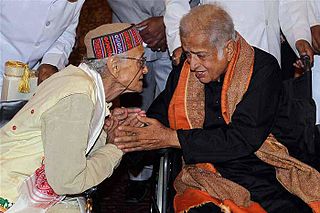
Mahim Bora was an Indian writer and educationist from Assam. He was elected as a president of the Assam Sahitya Sabha held in 1989 at Doomdooma. He was awarded most notably the Padma Shri in 2011, the Sahitya Akademi Award in 2001 and the Assam Valley Literary Award in 1998. Assam Sahitya Sabha conferred its highest honorary title Sahityacharyya on him in 2007.He also participated in the Quit India Movement of 1942 held in Kaliabor town in the Nagaon district of Assam.

Folk dances of Assam include the Bihu and the Bagurumba, the Bhortal, the Ojapali dance. Assam is home to many groups: Muslim, Indo-Aryan, Rabha, Bodo, Dimasa, Karbi, Mising, Sonowal Kacharis, Mishmi and Tiwa (Lalung) etc. These cultures come together to create an Assamese culture. Residents of the state of Assam are known as "Axomiya" (Assamese). Most tribes have their own language, although Assamese is the primary language of the state.
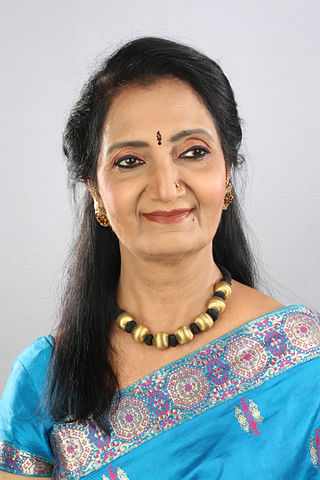
Beauty Sharma Barua is a singer from Assam, India. She is one of the best-known and most respected Assamese folk music, Indian classical music, ghazal and bhajan singers of Assam. More popularly known as The Melody Queen of Assam and Beauty Baideu, she has recorded over a thousand songs for All India Radio, Doordarshan, albums and others. She has sung songs in over six regional Indian languages, though primarily in Assamese and Hindi. Beauty Barua married renowned writer and lyricist Dwijendra Mohan Sharma (1948–2006), called the Man with Melody in His Pen by The Daily Telegraph, in 1976.
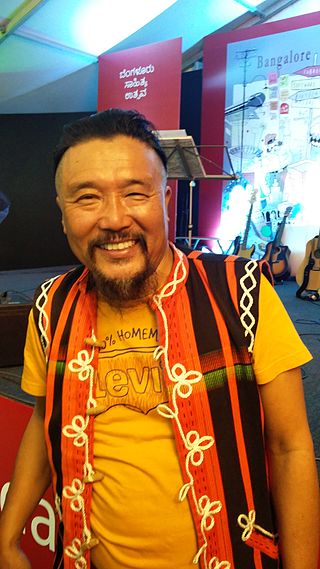
Rewben Mashangva, also Guru Rewben Mashangva, is a folk musician and singer from Manipur, India. He is known for reviving musical tradition of the Tangkhul Naga of Manipur, and use of traditional musical instruments in his songs. Influenced by musicians such as Bob Dylan and Bob Marley, Rewben Mashangva has created many Naga tribal folk songs based on blues and ballad rhythms. He is known by different names including, 'Bob Dylan of the Nagas' and 'King of Naga folk blues', plus 'Father of Naga folk blues'. He received the National Tribal Award 2011-12, for his contribution to the development of tribal music from the Ministry of Tribal Affairs, Government of India. The Government of India honoured him in 2021, with the award of Padma Shri, the fourth highest Indian civilian award for his rich contribution to art.

Imran Shah, also known as Nawab Imran Shah is an Indian Assamese language writer, poet, novelist, and scholar. He also writes under the pen names Ishan Dutta, Anamika Baruah, Kumbhakarna, and Animesh Baruah. The Government of India awarded him the fourth highest civilian honour of the Padma Shri, in 2021, for his contributions to literature and education.

Birendranath Datta was an Indian academic, linguist, author, researcher of folklore, singer, and lyricist. During his career, he worked mainly as a professor in a variety of Assam colleges. In 2009, he was awarded the Padma Shri, the fourth highest civilian award, for Literature and Education, and in 2010 he received the Jagaddhatri-Harmohan Das Literary award. Datta was elected as the president of Asom Sahitya Sabha for the 2003 North Lakhimpur Session, and the 2004 Hojai Session.
Dipali Barthakur was an Indian singer from Assam. Her songs were sung mainly in the Assamese language. She received the fourth-highest civilian award of India, the Padma Shri, in the year 1998.
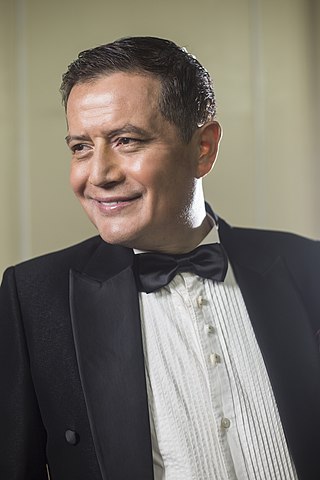
Neil Nongkynrih was an Indian concert pianist and conductor. He founded the Shillong Chamber Choir (SCC), which won the reality show India's Got Talent in 2010. He was awarded Padma Shri, the fourth highest civilian award of India in 2015.
Hemendra Prasad Barooah (1926–2013), was an Indian entrepreneur, tea planter and philanthropist known for his contributions to Assam tea and tourism industries. He was honoured by the Government of India, in 2013, that bestowed on him the Padma Shri, the fourth-highest civilian award, for his contributions to the fields of trade and industry.
Arup Kumar Datta is an Indian writer and Journalist from Guwahati, Assam. He has written 18 books for adults and 17 adventure novels for young people. In 2014 he was awarded the Life Time Achievement Honour by Association of Writers and illustrators for Children, New Delhi, the Indian chapter of the International Board of Books for Young People. He has also won numerous awards including the Shankar's Award in 1979, conferred to mark The International Year of the Child. He has been awarded the civilian award Padma Shri by Government of India in 2018.
Prahlad Chandra Tasa is an Indian writer and educationist, best known for his writings on education. He is the vice president of the Asam Sahitya Sabha where he has also served as a general secretary. He has published several books on educational and social issues, including Asomor chah janagosthi, an anthology of articles on the lives of the tea workers of Assam. The Government of India awarded him the fourth highest civilian honour of the Padma Shri, in 2016, for his contributions to literature and education.

Mukund Nayak, is an Indian artist. He is a folk singer, songwriter and dancer. Nayak is an exponent of Nagpuri folk dance Jhumar. He is recipient of the Padma Shri and Sangeet Natak Akademi Award.
Dhaneswar Engti is a poet-author from the Indian State of Assam promoting the use of the endangered Karbi language spoken by the Karbi people of Northeastern India. Engti has authored 19 books and written around 100 songs in the Karbi language. He has also served as the Joint Secretary of Karbi Anglong Autonomous Council. In the year 2022, Govt. of India conferred on him the Padma Shri award for his work towards the preservation and advancement of indigenous languages.
Jhumur or Jhumar or Jhumair is a folk music of Sadanic language spoken by people of Chota Nagpur plateau, primarily in Jharkhand, southwestern region of West Bengal and northern part of Odisha. Also in the Tea State of Assam due to emigration. Jhumar songs are sung in various social events by aboriginal communities like Kuṛmi, Oraon, Chik Baraik, Bagal, Bhumij, Rajwar, Munda.













